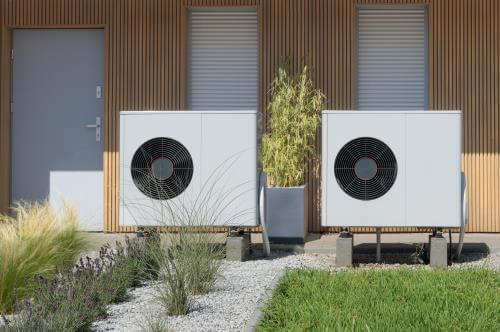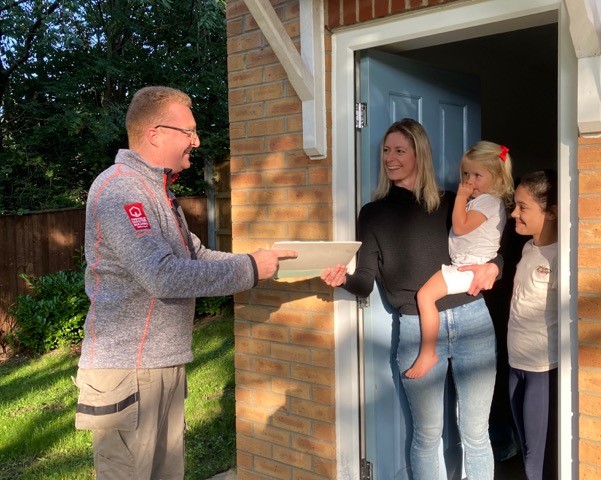Heat Pump Installation
Grants of up to £10,000 for new heat pump installations are now available – contact us for more information!
Thinking of upgrading your heating system to a more energy-efficient option? With both gas and oil boilers set to be phased out in the next decade, you’re not alone. In fact, all new build homes will feature a more sustainable alternative from 2025. So, if you want to get ahead of the crowd, look no further. At Add Heat, we have the perfect solution – an expert heat pump installation service spanning the North West. Discover how we could help you go green below.

Worcester and Daikin Authorised Dealer
What is a heat pump?
Designed to replace traditional heating systems, heat pumps are installed outside and are connected to an internal unit within your home. They draw in thermal energy from the air or ground around your property. This process heats up a chemical refrigerant (held at well below freezing) and turns it into vapour. The electric pump then compresses the gas to raise the temperature further. From there, hot gas is condensed back into a liquid and transferred to your heating system to warm your radiators. Some may also be stored in a hot water tank.
Dedicated, trusted tradesmen in the North West
Quality Workmanship
At Add Heat we pride ourselves on our high standard of work taking care of even the smallest detail to ensure you are 100% happy with the service carried out. Our reputation is what we have built our business upon and our attention to detail is what keeps our customers happy.
Expert Advice
With over 25 years experience in the heating industry Add Heat are proud to be able to offer you expert advice and answer any of your central heating questions. We have time served experienced tradesmen to help you whenever you need us. With Add Heat you know you are in safe hands.
Energy Saving
We are home energy savings experts and can provide you with expert advice on how to create and maintain a more energy efficient home or business.
What are the advantages of installing a heat pump?
Unlike gas, oil and LPG boilers, no fuel is needed for heat pumps and they emit very little carbon. Due to this, they are an increasingly popular option for people looking to reduce their carbon footprint. And you’ll also save on the constantly fluctuating cost of fuel.
In addition, heat pumps produce around three times more energy than they use. As such, they are both cheaper and cleaner to run than conventional boilers. They also generally need fewer repairs and should serve you well for at least two decades provided they’re serviced annually.
In fact, according to Green Match, you could save up to £1650 per year post heat pump installation. However, the exact amount will depend on your individual electricity tariff and how effective your home’s heating system is – pumps are most effective with underfloor heating.
Better yet, heat pumps are effective at temperatures as low as –20 °C – ideal for UK homes in all seasons. They also take up much less space than biomass boilers and run much quieter, making them easier to position. And you don’t need planning permission in England/ Scotland.

Do heat pumps come with any disadvantages?
The main downside of installing a heat pump applies to older properties and those short on space. The reason for this is that for the system to work efficiently, your home needs to be well insulated. And this isn’t always possible in older stone-built houses.
Additionally, as pumps heat water to a lower temperature than standard boilers, your heaters won’t be as hot – around 45°C vs 70°C. This is usually rectified by installing larger radiators and in many cases, underfloor heating too, which is highly effective. But in established properties, this isn’t always straightforward. And in small flats, sizeable radiators may not be practical. In this case, you may be better off with a warm air heating system instead.
Another key disadvantage of heat pump installation is the upfront cost for supply and fitting. But given the money you’ll save on fuel, the pump should pay for itself in around 7 years.
Which type of heat pump system is best?
Air source heat pump
Air source heat pumps, as the name suggests, extract heat from the air and then transfer it into your home using a refrigerant. These popular systems are eco-friendly and cheap to run, providing three units of heat for every unit of electricity consumed. Air source heat pumps are also the easiest to install, most affordable and require less outdoor space compared to ground source heat pumps. However, their performance may be affected by external factors like wind and temperature fluctuations. Therefore, they are not as efficient in extremely cold weather.
Ground source heat pump
Ground source heat pumps, on the other hand, extract heat from the ground through a series of underground pipes filled with a heat transfer fluid. These systems are known for their high efficiency and reliability, as ground temperatures remain stable throughout the year. Ground source heat pumps also typically require less maintenance versus air source heat pumps once in position. But they are significantly more expensive due to the labour costs associated with burying the pipes in the ground. Plus you’ll need ample garden space to accommodate them.
As a result, you’ll need to consider your budget, available space and energy efficiency goals to make the best choice. And if you’re still unsure, speak to our team for professional advice.
How much do heat pumps cost?
The price of installing a heat pump varies based on several factors. These include the type of pump you choose, the size of your home and any remedial work that needs to be carried out beforehand. For instance, installing new insulation or bigger radiators. With that said, you can expect to pay anywhere from £8,000 – £18,000 for an air source heat pump on average. And ground source heat pumps typically start from £15,000 and go all the way up to £40,000+.
This is a considerably higher upfront cost than purchasing and installing a gas boiler, which is usually around £2,000 – £4,000. However, heat pumps have an average lifespan of 20 years and require less maintenance. Plus, they should save you money on fuel bills in the long run.
Also, as the Government wants to reduce carbon emissions, grants are available to help fund these environmentally friendly pumps. As such, you could receive £7,500 towards your new heat pump installation. Learn more about the Boiler Upgrade Scheme on the Gov.UK website.
Heat pump installation: What’s involved?
1. Initial visit and quote
After receiving your enquiry, we’ll arrange for an experienced Add Heat engineer to visit and inspect your property’s suitability. They will need to see a copy of your home’s EPC Certificate to help establish its energy efficiency rating. From there, we’ll be able to suggest the most appropriate pump for your home, as well as where best to install it. We can also advise on any changes that should to be made to your existing system or insulation. You’ll have chance to ask questions and will receive a no-obligation quote before deciding whether to go ahead.
2. Site preparation
If you’re happy to move forward, the next stage is prepping your home for the pump. This may involve installing new or additional insulation to help retain the heat so the system doesn’t have to work too hard. Or we may recommend ordering larger radiators to be upgraded as part of the installation process. Additionally, the external heat pump unit will usually need a stable, concrete base on which to sit. However, we’ll let you know if this is required. We’ll also deliver any key system components in advance to help speed up the process.
3. Pump installation
If you’ve opted for an air source heat pump, installation should take between 2-5 days to complete. This includes installing and connecting the external and internal units, and adding a large hot water cylinder (if necessary). Plus installing new radiators as needed. The job will involve both plumbing and electrical work, but we’ll work as quickly as possible to ensure you’re not disconnected for long. We’ll also remove and seal off your old gas boiler too.
NB: ground source heat pumps usually take longer to install due to the groundworks involved.
4. Final checks and sign off
When everything’s in place, our time-served engineers will run various checks to make sure your heat pump is working correctly. These can range from testing the temperature of your radiators and hot water to releasing trapped air from the system. They will then demonstrate how to operate and adjust your heating system’s controls, before getting everything signed off.
Book an appointment with Add Heat now
Ready to take the first step in getting an energy efficient heat pump installed? We serve both domestic and commercial customers throughout Wilmslow, Cheadle, Stockport, Manchester and the surrounding areas. Simply call or email us with your query and contact details, and we’ll be in touch soon to arrange an initial home inspection.
Locations we cover
We cover a large area of approximately 20 miles radius of Macclesfield.